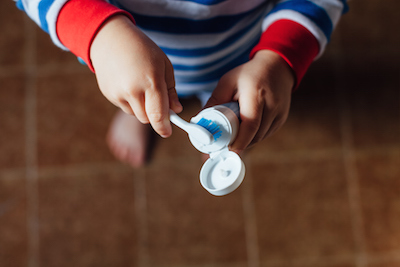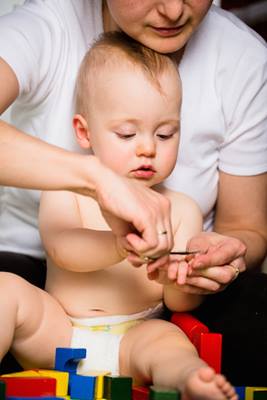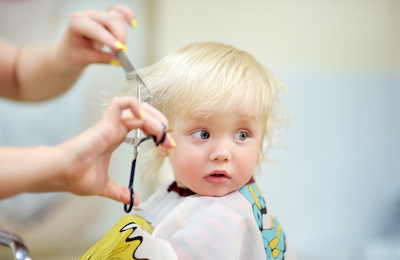What do you do if your child does not cooperate with hygiene tasks? Should you battle it out? Just let it go? Of all the tasks a parent must help their child with during a day, these can be the most challenging for parents and kids. They are often the “you have to” tasks for parents and the “I won’t” kind of tasks for the child.
This is a common problem for many kids, especially for kids with sensory processing issues. Sensory processing is how our brain and body process and interpret input from our sensory systems, such as vision, hearing, smell, taste, touch, and movement. Many hygiene tasks incorporate different sensory systems and can overwhelm a child. As an occupational therapist, I see kids and their parents with these concerns every day. I’d like to provide you with a few tips I’ve learned through the years to make these everyday tasks less stressful.
Tooth Brushing
 Tooth brushing can be a battle for every parent and child, but it is particularly difficult if your child has increased sensitivity in and around their mouth. You can help make your child’s mouth less sensitive by introducing other input to help normalize their sensation.
Tooth brushing can be a battle for every parent and child, but it is particularly difficult if your child has increased sensitivity in and around their mouth. You can help make your child’s mouth less sensitive by introducing other input to help normalize their sensation.
- Vibrating toothbrushes work great. Most kids love it even if they are averse to other stimulus.
- Soft bristles and warm water are also often more tolerable than harder bristles and cold water.
- To help your child begin to increase their tolerance for tooth brushing, start by brushing only a few times in each section of their mouth and in one direction. Slowly build up to brushing for a longer period of time.
Nail Clipping
Most kids that do not tolerate nail clipping are sensitive to touch on their hands and feet. In addition to the clippers, it could be that they don’t like the way the clippers, or your hands, feel on their skin.
 Before trying to clip their nails, provide deep pressure to fingers and toes such as massage.
Before trying to clip their nails, provide deep pressure to fingers and toes such as massage. - Deep pressure is very calming to your child’s sensory system. When cutting their nails, use a weighted blanket on their lap or hold them firmly to increase their tolerance.
- Clip their nails when they are soft and wet versus hard and dry.
- One of the tools from a sensory processing standpoint is providing oral stimulation. Chewing provides input to the sensory system that is calming and organized. Try giving your child something to suck on or chew during nail clipping such as gum, candy or a lollipop.
- It’s common sense, but breaking anything down into smaller steps or smaller bits of time can make it less stressful. Try only clipping a few nails at a time. Offer a reward or break and come back to the rest later.
Haircutting
- Use a spray bottle with water to wet your child’s hair instead of trying to lay them back in the sink.
- Massage
 their head prior to hair care to calm and organize. A scalp massager is a great option to massage your child’s head prior to hair care.
their head prior to hair care to calm and organize. A scalp massager is a great option to massage your child’s head prior to hair care. - If your child does not like the sound of the clippers, use scissors instead. Or vice versa.
- Using a heavy blanket on their lap will also help calm and organize them so they can sit longer.
- Following the haircut, make sure you change their clothes or brush off excess hair on their skin.
- If the noises in the barber shop are an issue, use headphones or ear plugs to help block out the noise.
- Make sure long hair is conditioned to decrease tangles and make brushing more tolerable. Spray detangler is a quick and easy option.
Parenting is challenging enough and when your child does not tolerate daily hygiene tasks, it can be extremely difficult. Making these tasks more pleasurable and tolerable for your child will make your everyday lives run more smoothly.









